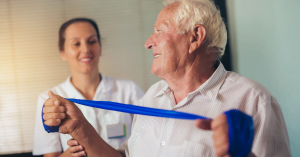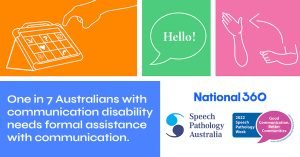Why Physical Activity is Important for Older Adults
We are all getting older, working & living at home for longer, and all deserve to have independence and autonomy in our older age. However, there are numerous effects of aging that we need to be aware of so we can make sure we best address and prevent concerns before they arise. These include:
- Decreased bone density
- Decreased muscle mass
- Decreased cardiovascular fitness
- Increased chronic disease
What can we do about it? At National 360, we have experience in assisting clients in their later years to maintain safety, promote independence and improve quality of life, and to do so, we enable people to move more!
Chronic diseases = exercise deficiency diseases.
Health benefits of physical activity and exercise are linked to volume and intensity exercise, with long-term physical exercise being less harmful for older adults than maintaining low usual activities. In addition to exercise, nutrition, stress-management, sleep, and social interaction are also very important factors to assess.

When are how should intervention be implemented?
There are numerous intervention options:
- Immediate (as soon as possible)
- Preventative / prehabilitation
- Re-ablement
- Assistive Technology
- Downstream impact
- Reduction in care hours
- Slowing the need for care
- Decreased demand on services
One way we can assist aged care clients is by prescribing exercise.
An exercise prescription can be individualised, targeted to goals, and include practical implementation. It can also involve resistance training, power training, balance, and aerobic exercise. Resistance training is safe for older adults, as physical exercise is less harmful than maintaining low activity levels.
For example, an exercise program might include resistance training, power training and balance training.
Did you also know that exercise can assist with Falls Prevention?
There is a high level of evidence that shows exercise and vitamin D supplementation prevents falls. Aerobic training alone has been shown to increase falls and fracture risk, therefore, multicomponent exercise interventions are effective in improving most, if not all, of the frailty syndrome hallmarks, in addition to educating clients on falls and associated injuries.
A way in which our team can assist clients with physical activity is through the implementation of Assistive Technology.
Approximately 1:10 Australians use Assistive Technology which can assist them in maintaining their independence and prolong the stay in their own home. Assistive Technology is most needed by older adults, those with disabilities, gradual functional decline and/or chronic conditions (according to World Health Organisation) and can include devices such as a walking aid.
However, some limitations of Assistive Technology may present as a hazard if not prescribed, used, or maintained correctly. Additionally, ongoing use of Assistive Technology may accelerate muscle weakness.
CASE STUDY
Mr S is an 84-year-old male living at home with his wife. He has a stroke 10 years ago, is a keen gardener and was referred for a new wheelchair.
Our Assessment – We identified that Mr S needed:
- Reablement – need for increased physical activity
- Education – activity modification and falls prevention
- Assistive Technology – review of current devices and identification of further needs
What we did:
- Assist with current wheelchair modifications
- Assist with researching, trailing and prescribing transit wheelchair
- Assist with researching, trailing, and prescribing new mobility scooter
- Cross referral to orthotist
- Completed therapy sessions to encourage increased physical activity
- Provided education on benefits of increased physical activity
- Falls prevention education
Outcomes
- Increased participation in activities of choice through provision of Assistive Technology
- Empowerment and autonomy
- Delay the need for formal supports
WHY NATIONAL 360?
National 360 is an allied health provider with Physiotherapy, Occupational Therapy, Speech Pathology and Positive Behaviour Support all under one roof. We focus on quality, and are mobile, so we can see clients in their own environment.
When you engage National 360, our team will:
- Complete an initial assessment and provide written recommendations
- Communication with case co-ordinator, client, and family to determine level of intervention required
- Offer client contact or a non-contact service
- Provide an individualised, holistic, high quality, and evidence-based service.
| What is involved in our Physio services? | What is involved in our Falls Prevention Program? There are multiple interventions across 8-weeks. |
|
|
|
|
|
|
|
|
|
|
| |
| |
| |
|
Find out more about our physiotherapy services here, or if you are ready to make a referral click here.



